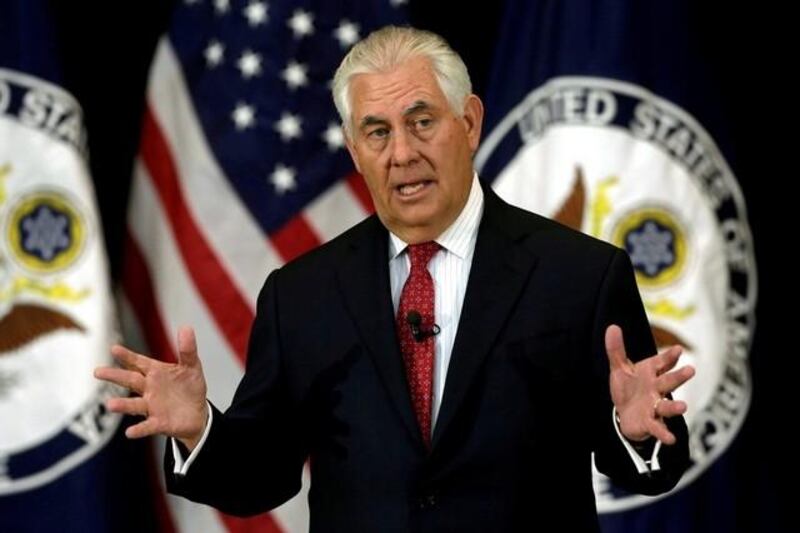ABU DHABI // Qatar has begun a "careful review" of the 13 demands presented by other Arab states to end the dispute over Doha’s support of extremist groups, the US state department said on Sunday.
The UAE, Saudi Arabia, Bahrain and Egypt on Thursday presented to Qatar their list, which includes closing down Al Jazeera, halting the financing of terror groups and stopping support for political opposition inside other GCC countries.
The US secretary of state Rex Tillerson said the countries should now "sit together and continue this conversation".
"While some of the elements will be very difficult for Qatar to meet, there are significant areas which provide a basis for ongoing dialogue leading to resolution," Mr Tillerson said.
He added that a lowering of rhetoric would "help ease the tension" and that the United States would continue to support the mediation efforts of the emir of Kuwait.
The list of demands was issued days after the US, which has 10,000 troops stationed in Qatar, called for the Arab countries to state what Doha needed to do to end the dispute.
Mr Tillerson’s comments came after Turkish president Recep Tayyip Erdogan dragged his country further into the row. Mr Erdogan said the list of demands were "disrespectful" and "an attack on Qatar’s sovereign right".
High on the list was a request that Qatar immediately halt military cooperation with Turkey and that Ankara should end its military presence in the country.
"We consider these demands against international law," Mr Erdogan said after Eid Al Fitr prayers on Sunday morning.
The group of Arab states broke diplomatic relations with Qatar on June 5 after long-standing concerns about its support for Islamist groups spilled into the open. The countries moved to isolate Qatar economically and cut off air, sea and land routes. They also banned most of their citizens from the country.
Turkey, which has important ties with all GCC countries, shifted its weight behind Qatar and within days accelerated military cooperation. Ankara also moved to meet the shortfall in food supplies to Qatar, much of which previously came across the Saudi border. Turkish dairy products have flooded Qatari markets, filling the gap typically occupied by Saudi suppliers.
Turkey’s prominence on the list of demands has pushed Mr Erdogan even further into Doha’s corner.
"He feels very much threatened and reads that the move is actually against him personally," said Abdullah Bozkurt, president of the Stockholm Center for Freedom and author of Turkey Interrupted, Derailing Democracy.
"He is very concerned about the next move and is trying to shore up the retaining walls for an upcoming storm using Qatar," Mr Bozkurt said, referring to potential domestic crises the Turkish leader could face.
Mr Erdogan’s ruling AK Party has its roots in Islamist politics and, like Qatar, supported Muslim Brotherhood groups during and after the Arab Spring.
The two countries signed an agreement in 2014 to open a base hosting up to 5,000 troops in Qatar and to coordinate military deployments in the future.
The deal lay stagnant in the Turkish parliament but was quickly rushed through for approval after the row erupted this month. The bill authorises the deployment of troops to the Qatar base and other military actions in the region.
It includes a provision stating "other tasks" as among the military exercises. "This opens the door to all kinds of clandestine military operations by inserting a vague/undefined term in the agreement. It empowers government legally to pursue avenues that won’t be subject to legislative or judicial scrutiny," said Mr Bozkurt.
Currently, there are 100 Turkish troops in Qatar, making up Ankara’s only military presence in the Arabian Gulf.
Turkey’s Hurriyet newspaper said last week a joint exercise by Turkish and Qatari forces was expected following Eid and that the number of Turkish soldiers deployed could eventually reach 1,000.
On Thursday, five armoured vehicles and 23 military personnel arrived in Doha in preparation for the exercises.





